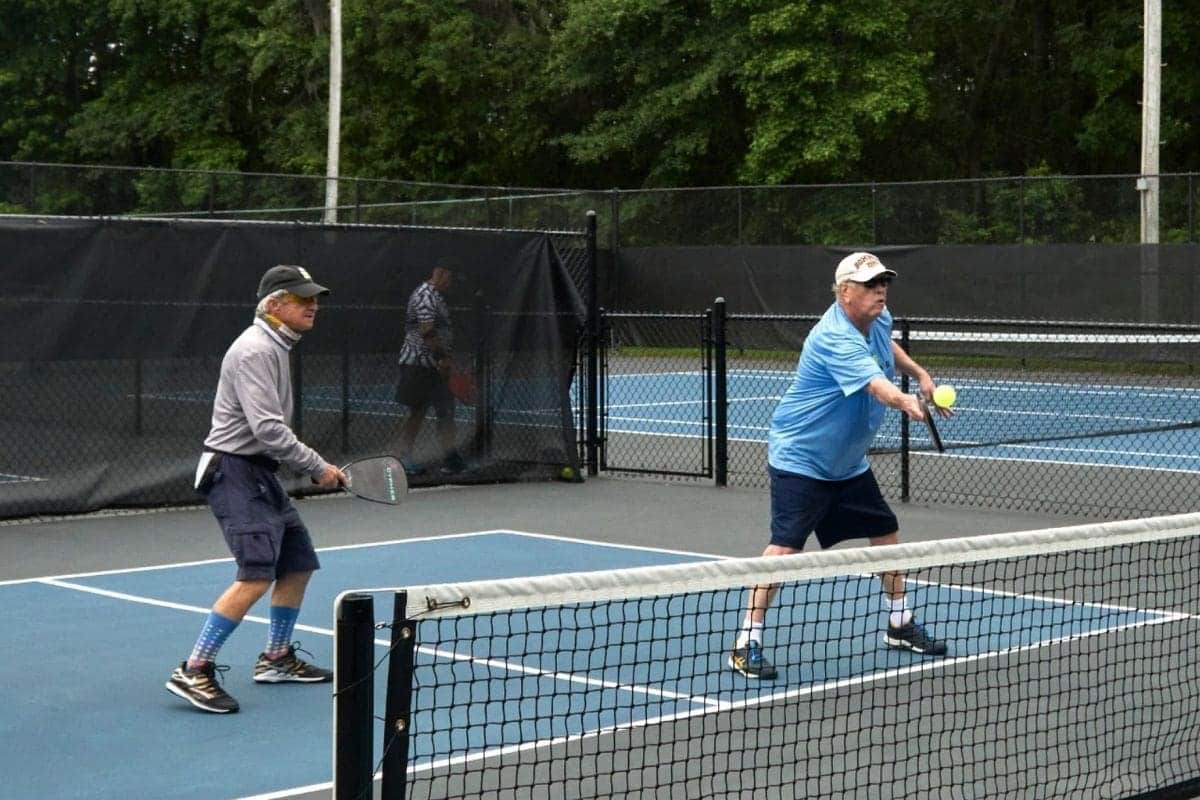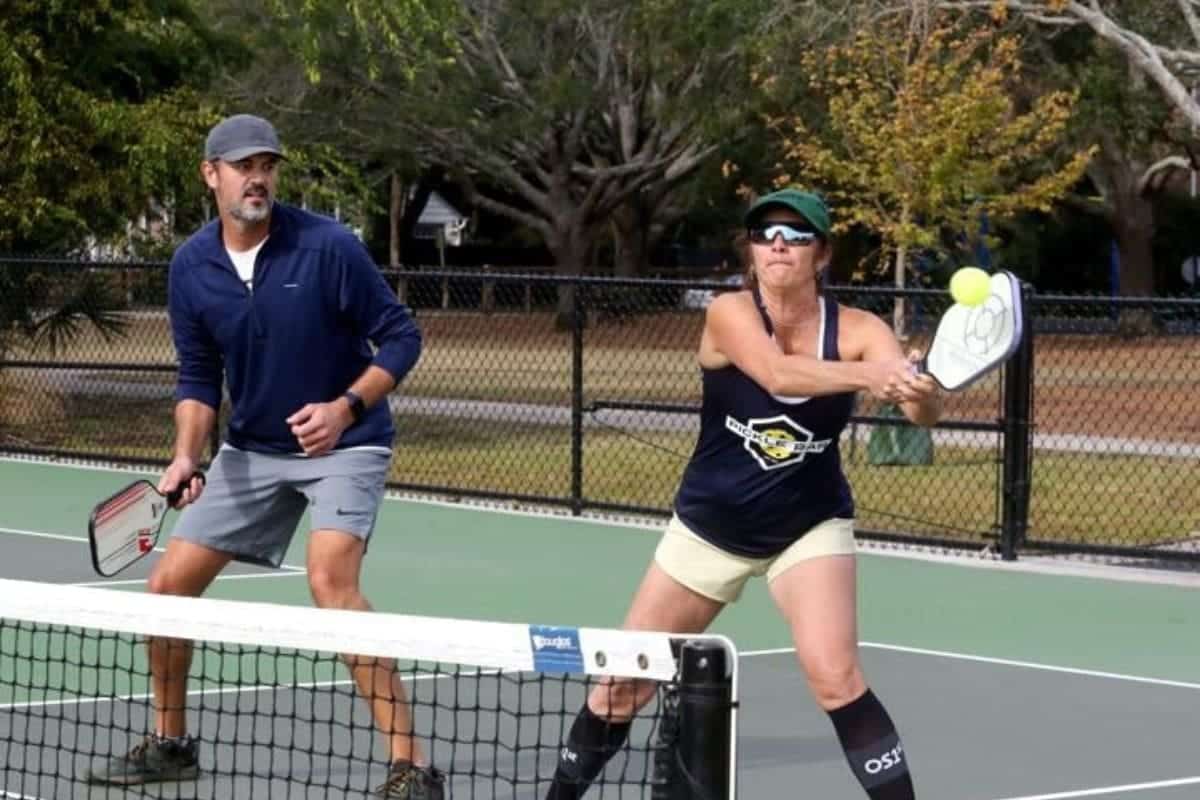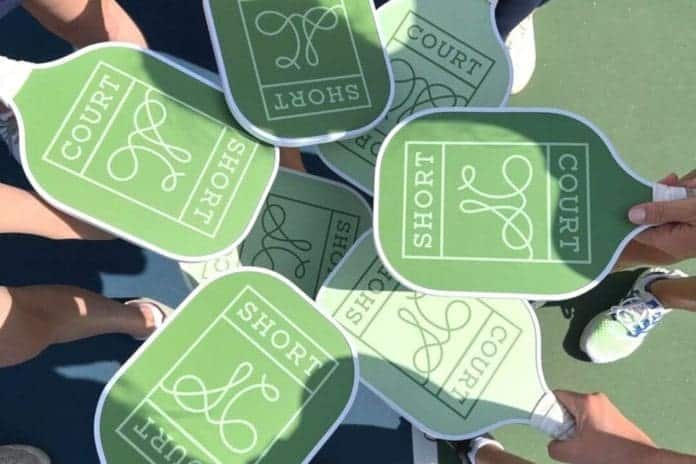Pickleball’s Debate in Charleston: Des Brown’s athletic journey in Charleston took an unexpected turn from football fields to pickleball courts. Growing up in the city, he sought a sport that matched his competitive spirit but offered gentler physical demands as he matured.
“I fell in love instantly with pickleball.” Brown enthused. For him, it wasn’t just a game but a family affair, enjoyed with both his children and his 73-year-old mother, a newcomer to sports.
Like thousands across the nation, Brown embraced pickleball during the COVID-19 pandemic when traditional sports and social activities were curtailed. However, Charleston’s rising pickleball community now faces a significant hurdle: court shortage.
Balancing Act
The squeeze on court space has ignited tension between pickleball enthusiasts and the city’s tennis players. As pickleball’s popularity surged, enthusiasts like Brown found themselves encroaching on the established tennis courts, sparking a debate over scarce recreational resources.
As pickleball’s fervent following swells in Charleston, the city finds itself grappling with a court shortage. Currently, only four pickleball courts are scattered across two parks on the peninsula—a paltry provision for the growing legion of enthusiasts.
“I don’t think the city anticipated pickleball’s explosive growth.” remarked Des Brown, founder of WePickle, an organization pioneering pickleball clinics, tournaments, and summer camps in the Charleston area.
At Moultrie Playground on any given weeknight, a scene unfolds as up to 40 pickleball enthusiasts eagerly await their turn on the two courts available. Their patience is tested, with waits often stretching to an hour—a testament to pickleball’s rising popularity in Charleston.
Rather than constructing additional pickleball-specific courts, which feature smaller dimensions and lower nets than standard tennis courts, the city opted for a different strategy. Existing tennis courts have been transformed into multiuse surfaces, marked for both pickleball and tennis. This decision, however, has ignited tensions between the two communities competing for precious court space.
Charleston maintains an extensive network of 70 tennis courts spanning from Daniel Island to Johns Island, encompassing outer West Ashley, James Island, and downtown. Yet, with pickleball’s rapid growth, 22 of these public tennis courts—nearly a third—have been repurposed into hybrid facilities.
Bill Ennis, president of the Lowcountry Tennis Association, highlights the challenge faced by both the sports. “The issue that we both have is we’re both at complete capacity in the Lowcountry in terms of having courts to play on. The key moving forward is to build more courts for both constituencies — pickleball and tennis.”

Pickleball Faces Opposition Beyond Tennis Players in Charleston
Charleston officials are grappling with a swell of complaints from pickleball and tennis enthusiasts, as well as local residents disturbed by the noise associated with pickleball play. The issues faced by the “Holy City” are mirrored in other communities nationwide, according to Yarbrough.
In Arizona, a law firm has compiled a comprehensive guide for homeowners associations, aiming to mediate conflicts arising between pickleball and tennis players. Meanwhile, Asheville, North Carolina, found itself refurbishing courts and replacing nets after a dual-lining initiative by the parks and recreation department led to unintended damage from rollaway pickleball nets.
Further north in Massachusetts, a town took decisive action by banning pickleball at a school’s tennis court following a lawsuit from neighbors citing noise concerns, as reported by The Enterprise in May.
Earlier this year, Charleston’s Alan Fleming Tennis Complex in Johns Island Park became a focal point of vandalism allegations. According to a police report dated March 7, four portable pickleball nets used on two of the six tennis courts were damaged, prompting police intervention.
The discovery of vandalism at Charleston’s Alan Fleming Tennis Complex has escalated tensions surrounding the city’s evolving court landscape. According to police reports, concerned citizens reported this latest incident as part of an ongoing pattern of destruction, marking a troubling development in a community already strained by conflicting recreational interests.
Residents living just 50 feet from the hybrid tennis-pickleball courts describe a relentless soundtrack of hollow plastic balls clacking against hard paddles, an incessant rhythm that disrupts the peace of the neighborhood. In response, the city has posted signs enforcing a strict start time of 9 a.m. for pickleball activities, hoping to alleviate disturbances and preserve residents’ morning tranquility. Parks Director Jason Kronsberg assured a concerned recreation committee that city officials were prepared to enforce these regulations with police oversight if complaints persisted.
The situation has further complicated plans for improvements at the nearby Charleston County School District park, where noise mitigation efforts are now a priority. The planned construction, which includes a sound barrier for both tennis and pickleball courts, necessitated the removal of trees separating the park from nearby homes. This adjustment has increased concerns over noise and light pollution, prompting city officials to propose restriping courts furthest from residential areas until a permanent solution is implemented.
Efforts to expand recreational facilities have also encountered resistance. A proposal to construct up to 12 illuminated new pickleball courts at Parkshore Park in West Ashley was recently stalled after community backlash regarding the courts replacing a beloved baseball field. City officials earmarked nearly $1.2 million for the project, only to shelve it indefinitely amidst concerns raised by Councilman William Tinkler and neighboring residents.
“The bottom line is I do not oppose the pickleball courts. I just think that the city needs to be a little bit more creative about about how pickleball courts are placed.” – (Tinkler)
The debate shows Charleston’s struggle to balance diverse recreational needs against the backdrop of rapid urban development and neighborhood preservation.
Problem For a Good Reason
In Charleston, the surge of interest in pickleball has presented a unique set of challenges and opportunities for the city’s recreational landscape. Despite setbacks such as the recent delay in West Ashley, where plans to construct new pickleball courts were shelved due to community concerns, the city remains committed to expanding its offerings. According to Charleston’s recreation director, funding earmarked for new pickleball courts remains intact, with ongoing exploration of alternative locations underway.
“You don’t always see a new trend start and jump in this hard. It’s a great problem to have, that we have so many people that want to be outdoors, loving our weather, loving our city, wanting to be playing stuff.” – (Yarbrough)
Des Brown, instrumental in promoting pickleball through his organization WePickle, echoed this sentiment, emphasizing Charleston’s need to keep pace with neighboring cities to maximize tourism potential. He pointed out the upcoming pickleball tournament at Collins Park in North Charleston as a prime example. Expected to draw hundreds of players, the event promises economic benefits as participants patronize local businesses and accommodations.
While private establishments like The Pickle Bar in Summerville and Crush Yard in Mount Pleasant capitalize on the sport’s popularity with pay-to-play courts, Brown emphasized the irreplaceable value of free municipal courts for fostering community engagement and skill development.
As Charleston handles the complexities of urban growth and recreational expansion, the evolution of its pickleball scene reflects a broader commitment to balancing tradition with innovation in a city celebrated for its charm and outdoor lifestyle.

News in Brief: Pickleball’s Debate in Charleston
Charleston’s pickleball community, led by enthusiasts like Des Brown, faces challenges amid its rapid growth, including court shortage and tensions with tennis players. Despite conflicts and setbacks, the city is dedicated to expanding its recreational offerings, with funding still earmarked for new pickleball courts and plans for tournaments like the upcoming event at Collins Park.
The surge in interest presents obstacles and opportunities for Charleston, highlighting the need for creative solutions to accommodate diverse recreational needs while preserving community harmony and enhancing tourism potential.
Also Read: Top Pickleball Courts in Washington



